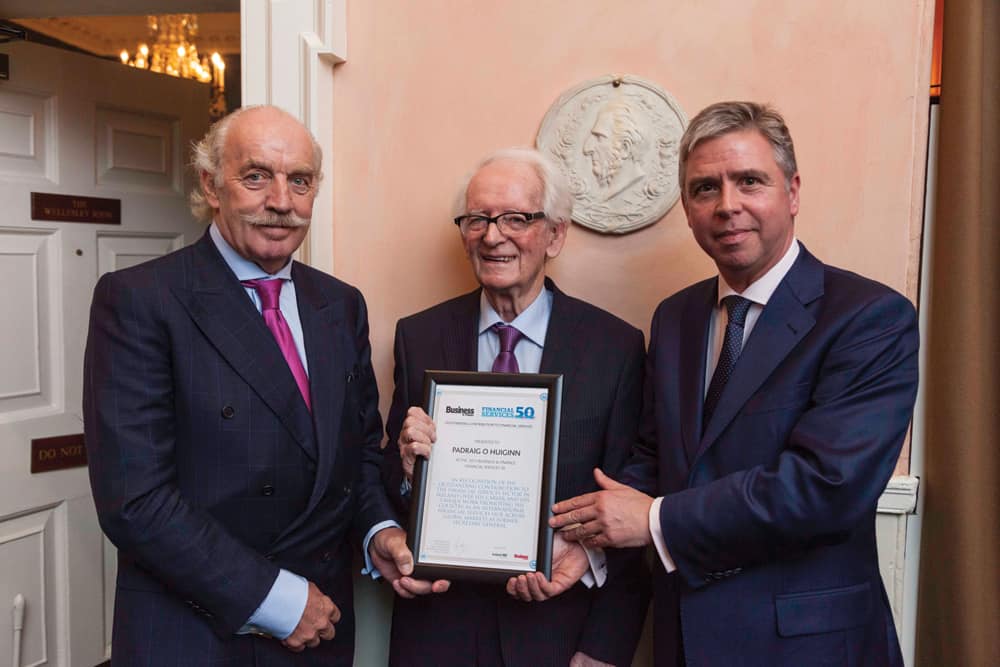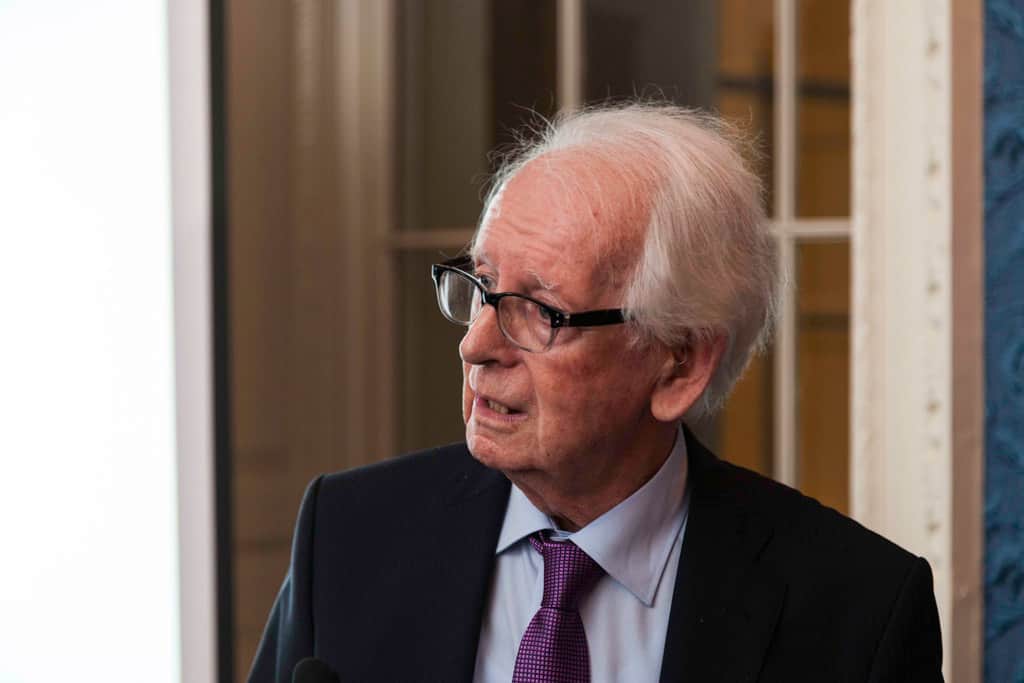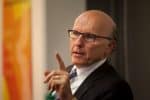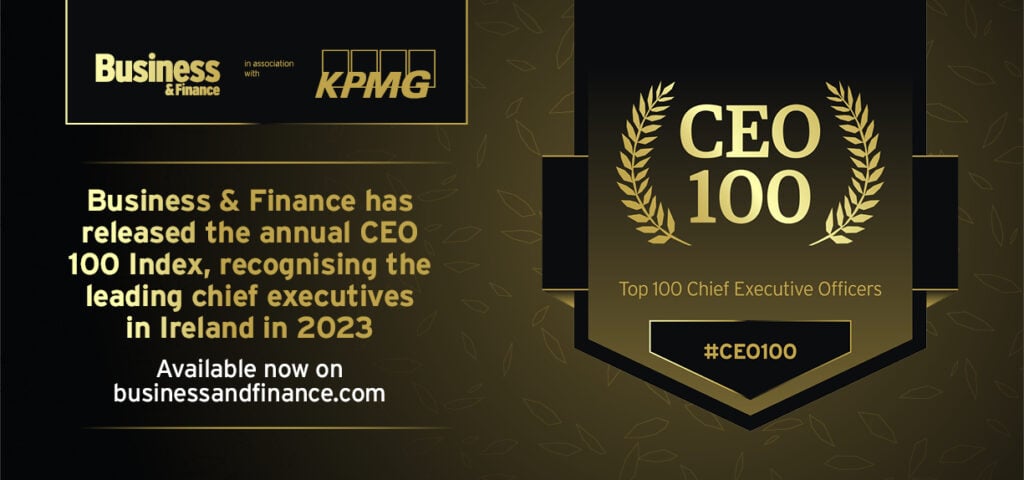Padraig O hUiginn honoured at the Business & Finance FS 50 launch, 2013
Senior civil servant and businessman had a fifty-year career in the Civil Service before retiring in 1993 – and moving into the private sector
Pádraig Ó hUiginn entered the civil service in 1941 and served for over fifty years where he was innovative in his endeavours to progress social and economical change and to capture and utilise opportunities for the benefit of all. He retired in 1993 – after postponing retirement twice – and moved into the private sector. His name is synonymous with high profile projects such as the IFSC, Temple Bar, and the Irish Museum of Modern Art (IMMA), but he is perhaps best remembered for his role as secretary general of the Department of The Taoiseach, a position he held from 1982-1993.
In addition to his secretary general role, Ó hUiginn also served as economic affairs officer, UN Economic Commission in Geneva; was officer-in-charge of Housing, Planning and Building at the UN Headquarters in New York; and was director for Regional Policy and deputy director general for Energy, Science and Technology at the EC Council of Ministers in Brussels.
After he left the civil service he experienced success in the private sector, most notably through his involvement as a director of Denis O’Brien’s Esat Telecom, which was taken over by British Telecom in 2000.
To mark his passing, we release this interview between Pádraig Ó hUiginn and Business & Finance publisher Ian Hyland from Ireland INC A History of Irish Business in 2017.
Padraig O hUiginn in conversation with Ian Hyland from Ireland INC A History of Irish Business

Dermot Desmond, honouree Padraig O’hUiginn, Business & Finance Publisher Ian Hyland at the Business & Finance FS 50 launch in 2013
The former secretary general of the Department of An Taoiseach discusses the IFSC, economic recovery and working closely with Charles Haughey.
Pádraig Ó hUiginn is among the most prominent civil servants in recent Irish history. He spent five decades in the public sector before retirement in 1993, rising to serve as secretary general of the Department of an Taoiseach between 1982 and his retirement.He is perhaps best remembered for his close working relationship with the former Taoiseach Charles Haughey, and played a prominent role in one of the most successful public-private partnerships in the history of the State: the International Financial Services Centre (IFSC) in Dublin’s Docklands in the late 1980s.
From school to the civil service
Pádraig Ó hUiginn went to school at St Finbarr’s College in Cork. From school he went straight to the civil service, although he subsequently completed a master’s in economic and social planning at the University of Edinburgh.
When Ó hUiginn achieved first place in the administrative officer exam he was assigned to the Department of Local Government. “When the government of which John Costello was Taoiseach was elected soon afterwards I was assigned to a special task,” he remembers. “The government, if elected, had committed itself to abolishing the city and county management system. The secretary of the department, John Garvin, suggested to the new minister, Mr [Patrick] O’Donnell, that before deciding what to do he should go around the country and meet all city and county councillors and the chairpersons of urban councils to see what they thought of the proposal to abolish the management system. The minister agreed and I was given the task of arranging all those meetings, attending them and noting the views of councillors. When the meetings, which went on over a number of months, were over, the secretary asked me to report on the views of councillors and make any proposals I thought should be considered.
“I wrote a very short report to the effect that councillors generally did not want the management system removed as they were part-time politicians and had businesses and jobs to look after and could not do the work of managers. Their basic complaint was that managers paid little or no attention to their views. I suggested that to correct this situation councillors should be given the power by a two-thirds majority to direct a manager to perform a managerial function in the way they wanted. I argued that this would make the managers consult councillors more for fear of their two-thirds majority power.
“The secretary accepted this proposal as did the minister and the government, and the law was amended to give the two-thirds majority power to councillors. This forced managers to consult more fully with councillors and the dissatisfaction of councillors with the system disappeared. Local government has functioned now for over 60 years under that revised system, which as a young junior civil servant I suggested.”
International adventures
Ó hUiginn worked at the United Nations, first in Geneva and then in New York, between 1956 and 1964. “When I worked at the UN in Geneva I published a study on housing,” he recalls. “In it I mentioned that rents in social housing should be sufficient to give funds to keep social housing in good repair. The Russian delegates wanted me to delete this recommendation but I refused. Two months later Khrushchev announced that he was adopting my recommendation by increasing rents so as to provide funds to keep social housing in good repair!”
Pádraig Ó hUiginn recalls the background to TK Whitaker’s Economic Development and the First Programme for Economic Expansion, considered by many to be the biggest factor in shaping the modern industrial economy. The Industrial Development Authority (IDA) had been set up in the preceding decade, and an inflow of foreign direct investment was feeding through to economic activity, he says. Before Fianna Fáil took office in March 1957, Whitaker “had complained we were spending too much on social investment, particularly housing. He wasn’t correct – we were spending proportionately more – but it wasn’t that we were spending too much, it was that we weren’t spending enough on economic investment.
“When the Fianna Fáil government came in he wrote the economic plan which emphasised much the same, and money was then found for the investment which had been lacking in the previous time. It was one of the reasons the government fell, because there was no money – yet when the Fianna Fáil government came in money was found.”
Joining the European Economic Community
Ó hUiginn says that the subsequent decision to join the European Economic Community was another important milestone in the development of the economy. “That was huge; we were now part of the EEC. The regional fund was coming in; that was an enormous benefit, and then the billions we got from the regional funds and subsequently the cohesion fund.”
Ó hUiginn acknowledges that anti-EU sentiment has risen over the past few years, particularly in the wake of the 2010 bailout, but Ireland has been a huge net beneficiary from Brussels since accession in 1973 and that should not be forgotten, he says. He went to Brussels that year as a director of regional policy in the Council of Ministers. In this role, O hUiginn had responsibility for setting up the original framework of the regional fund.
“I published a report on the extent to which the civil service was centralised in Dublin,” he remembers. “Two-thirds of civil servants were centralised in Dublin, whereas the proportion in other EC countries was 30-40%. In the light of this study the Council of Ministers agreed to loan me back to the government for two months to assist in developing a programme for a more decentralised civil service.”
Ó hUiginn also demurred at the appointment of Professor Colin Buchanan to advise on regional strategy as he came from the most urbanised state in the EC whereas Ireland had the highest rural population. “I published a study that showed how successful industry was in the county towns and that this should be a focus of development strategy. The IDA backed that view.”After a few years in Brussels he decided to return to Dublin and go back to the civil service. He joined the newly-minted Department for Economic Planning and Development, where Noel Whelan was the secretary general.
“I was there only a few months when Charlie Haughey abolished it,” he says: at the time this was seen as a power grab by the Taoiseach as he set up an economic policy group, under his control, to replace the department.
“Haughey abolished the planning department for the simple reason that you can’t have two ministers in parity to each other. The minister for finance has no special ability to take down the minister for planning. There was a basic conflict of two ministers of equal standing trying to run the economy. And that was why, partly, Haughey decided: he was acting as a managing director, when somebody at the centre has to make the decision and he decided to be that person. But that was normal at the time: even Margaret Thatcher set up an economic policy group in order to cut through the red tape and the slowness with which policy development goes through the cabinet system.
“The cabinet system works OK in normal times, but not when you want speedy decisions. A policy originates in a department and it has to circulate a draft memorandum around the place and it has to deal with copious notes being written and replied to and so on, and months pass – and eventually a memorandum incorporating everything goes to government and they all have to understand this and so on.”
Haughey set up his own economic policy unit in the aftermath of the oil crisis – which was standard procedure among OECD countries, says Ó hUiginn, because prime ministers all said: “We have to take charge, we’ve to run this like a business – we can’t be waiting for memos to go around.”
Breaking the marriage bar
Perhaps one of Ó hUiginn’s earliest and most significant contributions to public life came when he was the head of An Foras Forbartha, the National Physical Planning Institute, between 1964 and 1973. During this period he broke the marriage bar on employing women.
“I recruited a girl who was an expert – some qualification she had obtained in London on the protection and preservation of sand dunes; very important to us. We have so many sand dunes: we’re an island with sand dunes all over which are very dangerous if they are not treated.
“There are historical records of whole villages being consumed. The big threat at the time was the sand dunes in Brittas Bay [Co Wicklow] and this girl was working on this and laying out a plan for it and so on, when she came to me one day and said ‘I’m leaving you’ and I said ‘oh why?’ and she said ‘I’m getting married’.
“I said ‘congratulations’, but I said ‘you don’t have to leave’. ‘What do you mean?’, she said, ‘I have to after the marriage bar’. I said ‘no – are you prepared to come back as a consultant?’ and then she said yes, and I said ‘same terms’. ‘Yes,’ she said, ‘I’d be delighted and my husband will be even more delighted’, so she came back. I went to the board, and we had a mixed board of civil servants and they agreed without any thought that it seemed like the natural thing to do.
“I got a call from the head man in [the Department of] Finance, and he said ‘Pádraig I hear you have re-employed a girl who got married’ and he said ‘you can’t do that’, and I said ‘why not?’. And he says: ‘you know the marriage bar?’ and I said ‘I know, but we’re a private company and I have a mixed board and this girl is invaluable, I can’t let her go’.
“He says ‘you’re insisting on it’, and I said ‘yes I am, my board has approved it’ and he said ‘you’ll hear from us’. Within six months, Finance was in a similar case where a girl went to get married – she had come in as an administrative officer – and was going to retire upon marriage, and they said ‘no, you can stay on’. They ended the marriage bar six months after I broke it. It was the end of 1964.”
Economic recovery and the IFSC
However, the two key events for which Ó hUiginn will be most remembered are his role in the blueprint for economic recovery written in the mid-1980s, and the subsequent development of the International Financial Services Centre.
When Charles Haughey formed a minority Fianna Fáil government in 1987, the country was on the precipice. Unemployment was running at 18% and debt was at 122% of GNP. There had been calls for the International Monetary Fund to take over the running of the economy.
Haughey was implacably opposed to the idea, says O hUiginn. “If we bring these guys [IMF] in we’re gone. This is a parliamentary democracy and we have to run the country; we’re elected to do it, he says. If these guys come in, civil servants are going to run the country.” Ó hUiginn had been responsible for coming up with the seminal Strategy for Development document in 1986 through his chairmanship of the National Economic and Social Council. It called for much tighter control of public finances in order to rein in the ballooning levels of debt. He says that he told Garret FitzGerald, the then Taoiseach, that he should adopt the programme because “even Fianna Fáil will have to support you.
“He said no – I’m going to set up a committee, which included Professor [Brendan] Walsh from UCD and Tom Hardiman [former director general of RTÉ]. But I said this is urgent; I said how long will it take them to produce this report? I said that those people will not agree to produce a report in six months and in the end I think it took them a year and a half.
“I think MacSharry points out in his book that the delay was fatal. Of course Garret had the problem of the Labour Party, who wouldn’t compromise. But the reality of Garret FitzGerald is that he was not really interested in the economy; his interest was Northern Ireland.”
The Fine Gael-Labour coalition government fell because it could not agree spending cuts. Fianna Fáil formed a minority government in March 1987 with Haughey as Taoiseach and Ray MacSharry as the minister for finance. They quickly set about the Strategy for Development, which stabilised the public finances in the early 1990s and formed the basis for the Celtic Tiger.
Ó hUiginn says that MacSharry was “wonderful” as minister of finance. “I can remember he was unyielding in refusing extra expenditure and in cutting expenditure. I remember once pleading with him on behalf of some poor devils in Sligo, which was his own constituency, involved in something to do with rivers, and I said it wouldn’t cost much and he said ‘I’m not giving way to anybody, not even people in my own constituency’.”
Knock Airport
One of his more colourful encounters with Haughey was when the Taoiseach came back from a weekend away in Mayo. “He said ‘do you know Monsignor [James] Horan’ and I said ‘well I know who he is but I don’t know him’.
“Well he said ‘he’s the parish priest of Knock and he wants to build an international airport in Knock. What do you think?’” Ó hUiginn said that it would cost roughly €12m, which alternatively would only pay for a few miles of motorway.
“And he said Maurice Doyle [former secretary general in the Department of Finance] will never agree” – and Ó hUiginn told him to ignore Doyle: in no uncertain terms he told Haughey that he was in charge.
Supporting the filmmaking industry
Support for the creative industries was another high-profile Haughey-era policy, as Ó hUiginn recalls. “I suggested to Mr Haughey that we should stimulate filmmaking by giving tax relief on investment in filmmaking. The industry now employs 6,000 in filmmaking. I also suggested to Mr Haughey the tax incentive for rental housing, which was highly successful, employing 10,000 at one stage.”
Perhaps Ó hUiginn’s most enduring legacy is the role he played in setting up the IFSC. It was originally the brainchild of Dermot Desmond, the founder of NCB Stockbrokers, who approached Haughey about the idea. The then-Taoiseach approached O hUiginn about setting up and chairing a meeting with a number of vested interests from the public and private sectors.
“I was given the task by Mr Haughey of establishing the Financial Services Centre and succeeded in doing so. It now employs 30,000 people,” reflects Ó hUiginn. “Dermot and I knew each other; we played golf and so on. So we had a meeting and we called in all the experts both public and private, all the banks and so on, and they were all at a loss – the one question they were all asking, except the IDA who were very positive, was: what services are you talking about?
“Well I said ‘you’re bankers; you must know’. And they said ‘what financial services could we be attracting here?’”
Haughey heard about the lack of progress at the meeting and summoned Desmond and Ó hUiginnto his office. He put Ó hUiginn in charge of the project, with the full authority to make decisions. He then went about setting up a committee that would be responsible for selling the concept of the IFSC abroad. “Then the problem was that we were very slow at getting any takers, although I remember making a speech in London that said if you want to set up in Dublin we’d give you a decision in two weeks; I think it was six months in Luxembourg. But we weren’t getting the applications.
The IDA and the IFSC
“The IDA were the people to promote it so I said to Haughey that the IDA are very supportive but they are not into banking.” The special committee set up to promote the IFSC included Tomás F Ó Cofaigh, former governor of the Central Bank; Séamus Paircéir, former chairman of the Revenue Commissioners; Kieran McGowan from the IDA, and Mossie Horgan from the Department of Finance.
“I said if anyone can open the doors of the bank it’s Ó Cofaigh. And so we sent them all over the world, and Ó Cofaigh was able to get in to central banks all over the world.
“Then they started to flow: Dresdner [a German investment bank] came in; once you got one bank from a country the other banks followed.” The IFSC is now host to about 500 of some of the biggest financial institutions in the world; it directly employs over 35,000 people and contributes about €2.1bn every year to the exchequer.
And while the IFSC has played a hugely important role in the development of the economy, the domestic banking sector has not fared so well. Banks were a vital cog in the credit-fuelled property bubble of the 2000s, which resulted in the collapse of the financial system in 2010. Ó hUiginn says that the problem with the Irish banking system over the past few decades is that it was inefficient.
“The banking system was staffed by people who came in at the bottom of the rung a bit like the civil service – they had no real capacity; they just learned the business, they just knew the money came in and came out.” He believes that the recruitment process across the Irish banking system has to be reviewed.
He is also very critical of the State guarantee of the banking system introduced on the night of September 29th, 2008. The government should have gone to the EU Commission and European Central Bank before introducing the wide-ranging guarantee that eventually undermined the sovereignty of the State, he says.
“They should have gone to Europe the next day and said ‘we have a problem and it’s your problem’. By the time they did go to Europe, the guarantee was already in place so it was too late.”
Govermemnt reform
In addition, Ó hUiginn would like to see a major reform to the institutions of government. “We have 15 government departments in a population of 4.4 million, and there are 15 sub-ministries and sub-departments and I am quite sure this is not necessary. I said this to Leo Varadkar before he became minister [for health, at the time]. I said you could run an empire with 15 government departments and he said the British did it with seven.”
Upon retirement he joined the board of Esat Telecom, which was owned by businessman Denis O’Brien. Ó hUiginn says that O’Brien is one of the most able businessmen the country has produced.
He also says that Charles Haughey was a complex person with many different facets to his personality, and is well aware of his faults. “He had that ability to make decisions: he was a different politician. Johnny Ronan [the property developer] tried to buy his estate, and he said to me it was terrible negotiating with Haughey. I said to him: ‘you forget you’re negotiating with three people – he was a politician, a lawyer and an accountant. You rarely meet that.’ ‘Jesus’, he said, ‘that’s what it was’. But when I would have one argument Haughey would come up with another.”
Ó hUiginn has worked closely with some of Ireland’s most influential figures in business and in the civil service – and become a figure of immense historical impact in the process.







